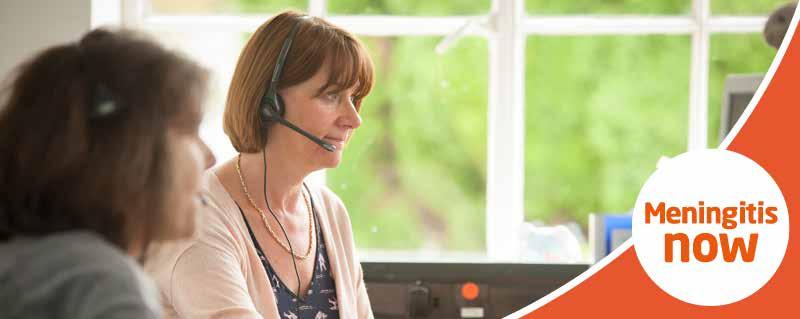
12 minute read
Support that makes a difference
The impact of Covid-19 was felt acutely across all areas of information and support, most noticeably on the nature and quantity of the vital services we deliver. There were numerous challenges along the way, but we remained determined to offer support to those who needed it most and to reach out to everyone who needed help, support and information. We continued to deliver our core services and provided one-to-one support for many people remotely. We also capitalised on opportunities to develop new online activities to meet the needs of people during the pandemic. This would not have been possible without the determination, dedication and experience of the team.
Nurse-led Helpline
Throughout the year, we kept our nurse-led Helpline open, providing valuable support and information to all those concerned about meningitis. At the beginning of the pandemic, when concerns about Covid-19 were at their highest, the Helpline was a lifeline for many. As anticipated, we continued to see an overall year-on-year downward trend in Helpline contacts (2,663 to 1,828), which was due mainly to a 46% reduction in Helpline calls. Whilst the reduction in Helpline calls is higher than expected, it is reflective of a year when the incidence of meningitis was low and the focus remained on Covid-19. The number of emails remained at similar levels to previous years, and we again saw a small increase in social media contacts. We continued to monitor the impact of the Helpline with a post call survey. As ever, the Helpline remains an invaluable first point of contact for people seeking help and support. All respondents found the information they received useful, and 100% of people felt more confident in dealing with the issues raised. People using the Helpline described it as ‘helpful and informative’, whilst calls were dealt with knowledgeably, and with compassion and understanding: “This has been absolute gold dust, I have been really struggling with my child and have found speaking with your staff and reading your website so helpful. It’s made me realise that it is normal to feel the way I do about some of the issues we have been having and that some of the mental and emotional issues are or could be linked to the meningitis. Thank you so much.” “The lady I spoke to was absolutely fantastic. Lots of real information and nice to be spoken to as a person and get that information without having to keep asking. Really, really amazing. I will also put a tweet out in case there is anyone else out there who needs this service.” We would like to thank the James Tudor Foundation and Pfizer for funding our Helpline and our expert nurses who deliver this service.
In April 2019, we introduced the Rebuilding Futures Fund to provide financial support to people of all ages impacted by meningitis. It was with great sadness that we had to pause the operation of the fund in April 2020 due to the effect of the pandemic on the charity’s finances. However, in June we opened the Young Futures Fund to help address the specific impact that Covid-19 was having on children and young people’s lives. This new fund provided emergency financial awards to support education, learning and development. This much-needed fund ensured that young people received items such as computers, sensory toys, garden equipment and online learning. The fund, which was oversubscribed within 24 hours of launch, made 62 awards totalling almost £24k to families across the UK.
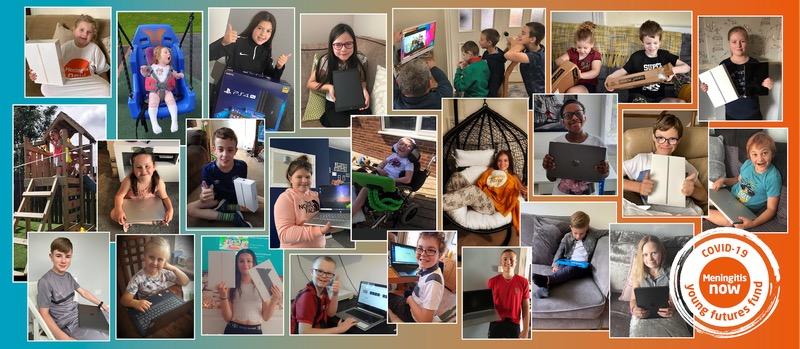
All of the award recipients stated that the financial support helped a lot and made a big difference to their lives:
“Luke’s self-esteem was at an all-time low, struggling at school, lockdown felt like the end of the line. The Chromebook gave him frustration-free access to research some entrepreneurial ideas for his future, designing his own future business webpage.” “Ella is now able to attend speech therapy online with her speech therapist. She has exercises she can do on the iPad, it has made a massive difference to her development.” “It was a relief to receive financial support during Covid as equipment is vital when we had limited therapies from the NHS.” We were able to reopen the Rebuilding Futures Fund in November and 35 people benefitted from an award including talking therapies, tuition and retraining, mobility aids and help towards funeral costs.
People have told us that: “It lifted my spirits knowing that somewhere out there is a fund willing to consider giving me financial support in my time of need. I will be eternally grateful.” “Thank you so much. I will respond in full once it has sunk in! I am just thinking of the ways that this is going to make my life so much easier. I really can’t believe it!” We would like to thank the many funders who enabled us to respond quickly to deliver the Young Futures Fund and distribute awards through the Rebuilding Futures Fund. These include the Worshipful Company of Butchers, Pixel Fund, BBC Children in Need, DWF Foundation, Hospital Saturday Fund, Sovereign Healthcare, Bruce Wake Trust, Doris Field Charitable Trust, Fence Club Trust Fund and the Hodge Foundation.
This year, the pandemic meant that we were unable to deliver our face-to-face support events, including our much-loved Family Days, Forever Days and residential weekends. This was difficult as we know how much families and individuals have benefitted from these events over the years. However, we were able to respond quickly to themes that emerged from the ‘Keep Meningitis in Mind’ survey and in September, we launched our new ‘Keep Connected’ virtual support events. We successfully delivered five pilot events during the year, including sessions on topics such as ‘Meningitis and Mental Health’, ‘Meningitis and Fatigue’ and ‘Meningitis and Legal Rights’ to 44 participants from across the UK. We would like to thank the team from Irwin Mitchell for providing expert knowledge to help us to deliver the Legal Rights session. Feedback from the sessions highlighted the value of sharing experiences in small groups as well as creating the space in which to feel validated and not judged. People also expressed the benefits of learning coping strategies and gaining confidence to deal with issues caused by meningitis. As one participant commented:
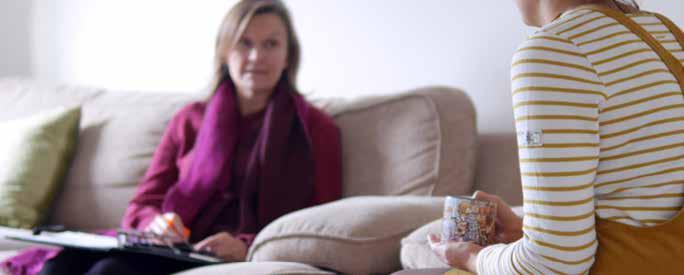
“It was really good to have someone in the group whose child was older and had been where we were and who could offer advice and suggestions as to routes to take as well as pitfalls to keep an eye out for. Sometimes I sit at home and wonder whether I’m imagining my daughter’s issues – it starts to feel that way when doctors and schools can’t see the issues that you as a parent can. The slides at the beginning were really helpful. I felt connected and it was good to speak with people who understand rather than people around me who think my child ‘looks fine to them’.” Following the success of the pilots, we will be embracing digital technology and planning a further programme of online support events in 2021-22 and beyond. Delivering support events online is a great way to reach people from all four nations, as the barriers to travel are eliminated.

Like all of our services, our successful Believe & Achieve Programme for young people aged 14-25 years was significantly impacted by the pandemic. However, with a much-reduced team, we were able to offer support remotely to the young people who needed us most. As the year progressed, several important activities commenced again, including counselling, peer mentoring, next step mentoring and coaching. Believe & Achieve’s social media community played an important role in supporting delivery during lockdown, with 79 posts, 257 comments and 682 reactions gathered between March and August 2020. Encouragingly, 11 new people joined Believe & Achieve on social media, suggesting this support channel is engaging young people. In line with the delivery of our new online support events highlighted above, we delivered six additional sessions as part of the Believe & Achieve Programme. This included several sessions focusing on after-effects (Health Anxiety and Concentration and Fatigue), as well as four social events. These enabled 72 participants to come together, have fun, share experiences and learn new things. “Thank you for making me feel much less isolated, I really appreciated the session this evening. I needed this feeling of community, especially since at Uni everything is so restricted socially. It’s been pretty isolating, so it has been great to touch base with some faces from a pre-Covid life.”
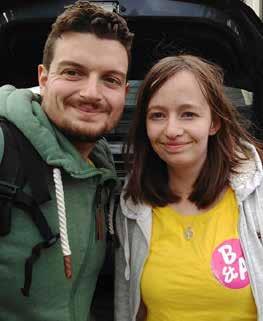
Despite the many challenges brought about by Covid-19, we were delighted to be able to work with Chrysalis Research to produce a three-year impact report as planned. The evidence is very clear – the Believe & Achieve programme has had, and is continuing to have, a significant effect on the lives of the 127 young people who have been involved in the programme since March 2018. Highlights from the report include: • The programme has engaged young people in many parts of the UK, with all four nations represented. • When young people have chosen to engage in-depth with the programme, nearly all improved in at least two of the three key outcome areas. • Seven out of ten young people showed substantial improvement in at least one outcome area.
• 61% of young people participated in at least one face-to-face or social event over the last three years, making this strand of activity the most popular means of engaging with the programme. • A key strength of the programme lies in the sense of community that has been fostered over the years. Of all the outcomes, ‘Being part of a Community’ saw the greatest improvement. • Believe & Achieve has been successful due to many factors including a flexible journey of tailored support, ongoing involvement by the young people and getting to know them individually, as well as ongoing reflection, learning and evaluation built into the programme design.
A young person’s journey through Believe & Achieve
The story of one young person who showed substantially improved outcomes across all three areas is illustrated below. It reveals how the various interventions and activities offered by Believe & Achieve have collectively made a significant difference to the achievements and outlook of this young person.
Continuing to deliver this programme would not be possible without the support of our funders, The National Lottery Community Fund and BBC Children in Need.
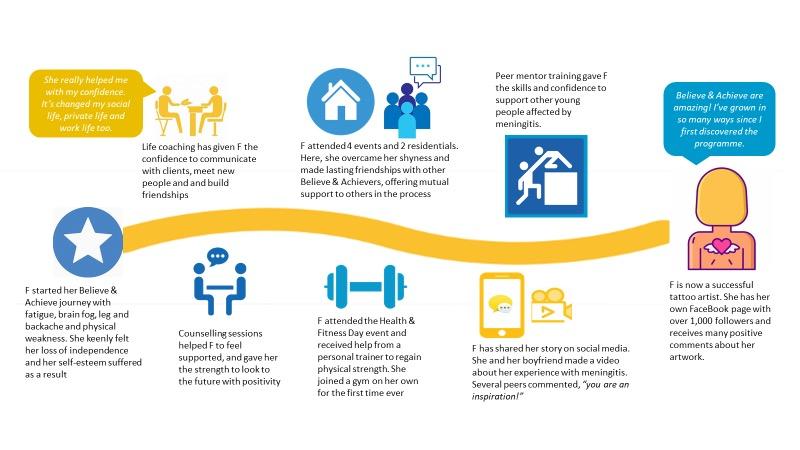
Online Peer Support
Our online peer support groups and Health Unlocked community continue to go from strength to strength. With over 600 posts shared across our ‘Peer Support Group’ and ‘Bereavement Group’, we continue to connect people with similar or shared experiences. For many people, these groups helped them feel less alone during lockdown and provided unique support during this difficult year: “I feel so much better that I have been able to share my story with the group without even knowing any of you. Thank you all, I hope that I will be able to give support when needed. The strength that this group has is unique." For a fourth consecutive year, membership of both online support groups grew. For example, during the year we saw an 11% increase in the number of new members on our ‘Peer Support Group’. As we embrace digital technology in the coming years, online peer support will remain an important part of our service delivery. Despite the difficulties faced this year, we continue to make a difference to the lives of many people who have experienced meningitis. The changes brought about by the pandemic provided opportunities for adaptation, learning and development in several key areas of our support. This will have long-lasting benefits for those whom we support as we help them to face the future with hope and confidence. However, continuing to deliver the breadth of information and support will be challenging, as we move into 2021-22 with a significantly reduced team and the ongoing uncertainty surrounding the pandemic and the lifting of restrictions.


Our Volunteers
This year has been particularly difficult for our wonderful Ambassadors and volunteers, who are a vital part of the Meningitis Now family. Early in the pandemic all of our face-to-face volunteer activities stopped. However, we were grateful for the incredible support they have shown us. Despite numerous obstacles, our volunteers have remained committed and have taken every opportunity, however small, to support us remotely through fundraising and raising awareness in schools, universities, businesses and community groups. For example, in December one volunteer stepped outside her comfort zone to give a virtual talk to 150 Year-13 students. She told us:
“We are all trying to find our feet in this new normal, so I am pleased to say I managed my first ‘virtual’ awareness talk and am now poised to forge ahead with more – it wasn’t as challenging as I’d feared!” We worked hard to keep in touch with our volunteers including regular posts on Facebook and email updates, and in June we took the time to say a special thank you as part of National Volunteers’ Week. It was with sadness that we were unable to hold our annual Ambassador Day in July, but we did the next best thing by hosting two online events in the Autumn that were well attended. This provided a great opportunity to catch up and share experiences. In addition, later in the year we reintroduced virtual one-to-one ‘Ambassador Reconnection Sessions’, with many more planned for next year. The change in volunteer activity levels provided the team with an opportunity to review and improve many of our processes and materials. For example, we created a virtual short talk which will be a valuable asset as we move into next year. As we begin to focus more on the year ahead, we look forward to working with our volunteers and Ambassadors and meeting up safely when restrictions allow.









